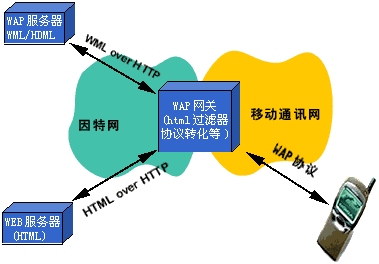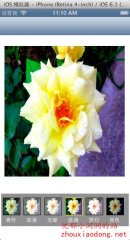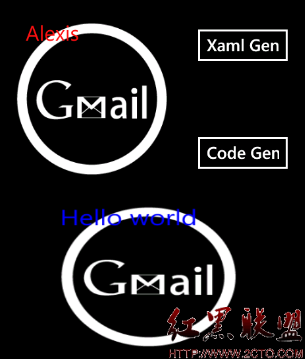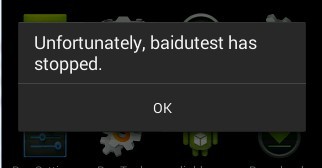与众不同windows phone(1)-Hello Windows Phone
介绍
与众不同 windows phone 7.5 (sdk 7.1)
• 使用 Silverlight 开发 Windows Phone 应用程序
• 使用 XNA 开发 Windows Phone 应用程序
• 使用 Silverlight 和 XNA 组合开发 Windows Phone 应用程序(在 Silverlight 中融入 XNA)
示例
1、使用 Silverlight 开发 Windows Phone App 的 Demo
MainPage.xaml
<phone:PhoneApplicationPage
x:Class="Silverlight.MainPage"
xmlns="http://schemas.microsoft.com/winfx/2006/xaml/presentation"
xmlns:x="http://schemas.microsoft.com/winfx/2006/xaml"
xmlns:phone="clr-namespace:Microsoft.Phone.Controls;assembly=Microsoft.Phone"
xmlns:shell="clr-namespace:Microsoft.Phone.Shell;assembly=Microsoft.Phone"
xmlns:d="http://schemas.microsoft.com/expression/blend/2008"
xmlns:mc="http://schemas.openxmlformats.org/markup-compatibility/2006"
mc:Ignorable="d" d:DesignWidth="480" d:DesignHeight="768"
FontFamily="{StaticResource PhoneFontFamilyNormal}"
FontSize="{StaticResource PhoneFontSizeNormal}"
Foreground="{StaticResource PhoneForegroundBrush}"
SupportedOrientations="Portrait" Orientation="Portrait"
shell:SystemTray.IsVisible="True">
<StackPanel>
<!--按钮-->
<Button Name="btn" Content="hello webabcd" />
</StackPanel>
</phone:PhoneApplicationPage>
MainPage.xaml.cs
using System;
using System.Collections.Generic;
using System.Linq;
using System.Net;
using System.Windows;
using System.Windows.Controls;
using System.Windows.Documents;
using System.Windows.Input;
using System.Windows.Media;
using System.Windows.Media.Animation;
using System.Windows.Shapes;
using Microsoft.Phone.Controls;
namespace Silverlight
{
public partial class MainPage : PhoneApplicationPage
{
public MainPage()
{
InitializeComponent();
this.Loaded += new RoutedEventHandler(MainPage_Loaded);
}
void MainPage_Loaded(object sender, RoutedEventArgs e)
{
// 弹出 MessageBox 信息
btn.Click += delegate { MessageBox.Show("hello webabcd"); };
}
}
}
2、使用 XNA 开发 Windows Phone App 的 Demo
Game1.cs
using System;
using System.Collections.Generic;
using System.Linq;
using Microsoft.Xna.Framework;
using Microsoft.Xna.Framework.Audio;
using Microsoft.Xna.Framework.Content;
using Microsoft.Xna.Framework.GamerServices;
using Microsoft.Xna.Framework.Graphics;
using Microsoft.Xna.Framework.Input;
using Microsoft.Xna.Framework.Input.Touch;
using Microsoft.Xna.Framework.Media;
namespace XNA
{
// 启动时先 Initialize,再 LoadContent,退出时 UnloadContent
public class Game1 : Microsoft.Xna.Framework.Game
{
// 图形设备(显卡)管理器,XNA 在游戏窗口上做的所有事情都要通过此对象
GraphicsDeviceManager graphics;
// 精灵绘制器
SpriteBatch spriteBatch;
// 2D 纹理对象
Texture2D sprite;
public Game1()
{
graphics = new GraphicsDeviceManager(this);
// 指定游戏窗口的宽和高,不设置的话会花屏
graphics.PreferredBackBufferWidth = this.Window.ClientBounds.Width;
graphics.PreferredBackBufferHeight = this.Window.ClientBounds.Height;
Content.RootDirectory = "Content";
// 两次绘制的间隔时间,本例为每 1/30 秒绘制一次,即帧率为 30 fps。此属性默认值为 60 fps
TargetElapsedTime = TimeSpan.FromSeconds(1f / 30);
// 当禁止在锁屏状态下运行应用程序空闲检测(默认是开启的)时,将此属性设置为 1 秒钟,可减少锁屏启动应用程序时的耗电量。此属性默认值为 0.02 秒
InactiveSleepTime = TimeSpan.FromSeconds(1);
}
/// <summary>
/// 游戏运行前的一些初始化工作
/// </summary>
protected override void Initialize()
{
base.Initialize();
}
/// <summary>
/// 加载游戏所需用到的资源,如图像和音效等
/// </summary>
protected override void LoadContent()
{
spriteBatch = new SpriteBatch(GraphicsDevice);
// 将图片 Image/Son 加载到 Texture2D 对象中
sprite = Content.Load<Texture2D>("Image/Son");
}
/// <summary>
/// 手工释放对象,游戏退出时会自动调用此方法
/// 注:XNA 会自动进行垃圾回收
/// </summary>
protected override void UnloadContent()
{
}
/// <summary>
补充:移动开发 , Windows Phone ,




